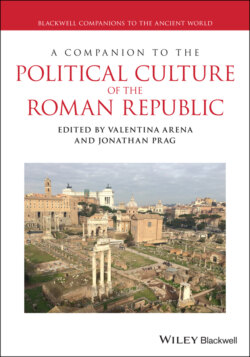Читать книгу A Companion to the Political Culture of the Roman Republic - Группа авторов - Страница 40
3.6 Monarchism
ОглавлениеAs we have seen, then, Rome was often used to think through the claims of popular and aristocratic government, and to grapple with the relationship between the many and the few. But Rome also came into play when considering the possibility of monarchical rule, whether Stuart or Cromwellian. Scholars dispute whether early modern republicanism should be defined by anti-monarchism (Worden 2002). Certainly not all of those who we tend to class as republicans were willing to exclude all forms of monarchy under all circumstances, and those who valued virtue more than institutional forms could invoke Aristotle’s criterion of superlative virtue to justify some forms of single rule – as Milton did for Cromwell’s rule in 1654 (Worden 2007: 257). If Rome was understood, in a Polybian vein, as a mixed polity composed of monarchy (the consuls), aristocracy (the Senate) and democracy (the popular assemblies) (see Chapter 8), then a quasi-monarchical role such as Cromwell’s might be justified by Roman precedent as part of a genuinely republican constitution. However, the consular role as such was a poor analogy for what actually happened in the 1650s, with Cromwell appointed for life and not elected. Thus, depictions of Cromwell as a Roman republican hero tended to sidestep the question of his exact constitutional role, while critics of Cromwell looked to the late Republic and the early emperors for exempla which proved that the extension of office – whether that of dictator or that of consul – could only portend the extinction of republican freedom. Even James Harrington, who defended a provision for temporary dictatorship (in the form of a committee) in times of emergency on the basis of Roman precedent and Machiavelli’s approval, was attempting to persuade Cromwell to relinquish his protectoral power rather than prolong it (Harrington 1977: 252–255).
Attitudes to the Lord Protector – Oliver Cromwell, followed by his son Richard Cromwell – were sometimes expressed in rather veiled terms, and even praise could display considerable ambivalence (Norbrook 1999: 326–378). A ‘single person’ at the head of the state – and one who had achieved his place through military leadership – could be presented as a Roman republican hero. Such classicising representations of Cromwell, as Laura Knoppers has shown, made room for praise of Cromwell to be framed in republican terms (rather than terms which implicitly threatened the republic) in pre-Protectoral works such as Payne Fisher’s Irenodia Gratulatoria of 1652. Fisher ‘both links and dissociates’ Cromwell and Caesar in this Latin panegyric, invoking the comparison only to pointedly deflect it by contrasting Cromwell’s virtue and self-control with the empty applause of the Roman triumph and the avarice implied by Caesar’s violation of the treasury of Saturn (Knoppers 2000: 58–66). Similarly, Milton’s 1654 account of Cromwell’s triumph over his own passions and defeat of private interest and kingship gave the title of pater patriae (father of the fatherland), which he bestowed on him, a republican edge – perhaps reinforced by the disapproving reference elsewhere in the text to Catiline’s conspiracy, which Cicero had capitalised on to be granted that title himself. Cromwell remained civis maximus & gloriosissimus, dux publici consilii (the greatest and most glorious of our citizens, the director of public counsel), a republican citizen and leader rather than an Imperator (commander or emperor) in any sense but the military (Milton 1933: 222–223).
Other republicans, however, were to align Cromwell with Caesar rather than with Cicero. Edward Sexby, urging the assassination of Cromwell, turned around the pater patriae trope when he addressed Cromwell: ‘All this we hope from your Highnes [sic] happie expiration, who are the true Father of your Countrie, for while you live we can call nothing ours, and it is from your death that we hope for our inheritances’ (Sexby 1657: title page). Caesar – soon to be assassinated – may be the model for this more sinister version of the pater patriae. John Streater, a notably populist republican, recoiled particularly violently from Cromwell’s elevation to the Protectorate, which he was warning of, with Roman parallels, several months before it actually happened. For Streater, the dictatorship of Caesar was an example of the dangerous concentration and prolongation of power in the hands of one person. Streater’s contemporaries should study such cases to see ‘how persons that affect absolute Government endeavour the accomplishment thereof’ (Streater 1653: 1–2, 5, 18). Whether republicans were contemplating the tyranny of Charles I or of Oliver Cromwell, Roman examples of tyrannicide could afford useful arguments: Sexby drew on Roman texts in constructing his argument for the assassination of Cromwell, but Milton’s Second Defence, justifying the regicide, also drew on Cicero in arguing that a tyrant is ‘the general enemy… of the whole human race’ (Milton 1932: 196–197).
